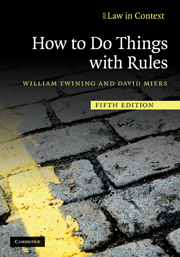Book contents
- Frontmatter
- Contents
- Preface
- Online appendices
- Acknowledgements
- Abbreviations
- Table of statutes and legislative instruments
- Table of cases
- Part I
- Part II Reading, using and interpreting rules in general
- Part III Reading law: reading, using and interpreting legislation and cases
- 6 Routine and problematic readings
- 7 Legislation
- 8 Interpreting legislation
- 9 Reading cases
- 10 The European dimension
- 11 Rules, reasoning and interpretation
- Part IV
- Index
- Resources on the web
- References
7 - Legislation
Published online by Cambridge University Press: 05 June 2012
- Frontmatter
- Contents
- Preface
- Online appendices
- Acknowledgements
- Abbreviations
- Table of statutes and legislative instruments
- Table of cases
- Part I
- Part II Reading, using and interpreting rules in general
- Part III Reading law: reading, using and interpreting legislation and cases
- 6 Routine and problematic readings
- 7 Legislation
- 8 Interpreting legislation
- 9 Reading cases
- 10 The European dimension
- 11 Rules, reasoning and interpretation
- Part IV
- Index
- Resources on the web
- References
Summary
Introduction
In this and the following chapter we apply the lessons of Chapter 6 to reading, using and interpreting legislation. The term ‘legislation’ can be used to encompass a wide variety of rules in fixed verbal form, including Acts of Parliament, the rules of European Community law, legislation made by the devolved legislatures, and subordinate legislation, such as statutory instruments and the by-laws of local authorities. It can also include rules issued by statutory bodies and regulatory agencies. Though not enacted by a formal legislative process, such rules have assumed increasing importance; and are usually regarded as binding by those to whom they are addressed. They may carry significant legal consequences in the event of non-compliance. Here, we shall concentrate on statutes, as they are the primary legislation with which law students are most familiar. Our aim is to identify those features of the legislative process that contribute to some of the difficulties which may be encountered when reading, using and interpreting statutory rules. Chapter 8 deals specifically with their interpretation. Although what we shall say directly concerns statutes, many of the features discussed apply to a greater or a lesser extent to the preparation and publication of other forms of legislation, and of other rules in fixed verbal form.
We shall, for the most part, be concerned with the principal form of legislation enacted by the United Kingdom Parliament, the public general Act.
Information
- Type
- Chapter
- Information
- How to Do Things with Rules , pp. 193 - 229Publisher: Cambridge University PressPrint publication year: 2010
